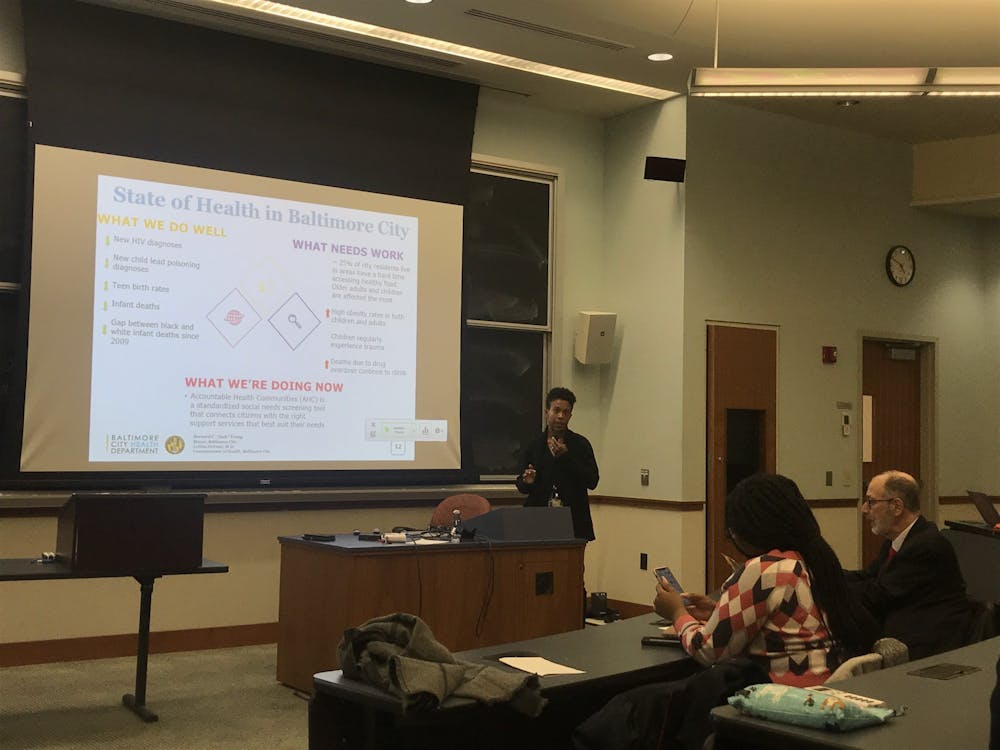The University hosted Baltimore City’s Health Commissioner Dr. Letitia Dzirasa on Tuesday, Feb. 11 as a special guest lecturer in Professor Philip Leaf’s Public Health and Well-Being in Baltimore class. Dzirasa discussed the role of the Baltimore City Health Department in addressing public health crises as well as some of her plans for future health projects.
Before Dzirasa became health commissioner in March 2019, she trained as a pediatrician at the Hopkins School of Medicine and worked as the medical director of school based health and quality. Her areas of expertise include obesity management, trauma care for children and adolescents and technological improvement of health-care systems.
She began her lecture by presenting a general overview of the role of the local health department and its many different sectors. Their services include preventing disease and injury, promoting healthy lifestyles, child and family support and services for the elderly.
“We make sure the conditions in which people live and work are healthy, research disease and injury prevention and educate the community on health risks. We also advocate for policy to protect the health of the community, and we partner with other community-based organizations to help the community live longer and healthier lives,” Dzirasa said.
She illustrated the general state of health and social determinants that affect health in Baltimore, pointing out many statistics on HIV/AIDS cases, disparities between household incomes, trauma levels, life expectancy and gender demographics.
One pressing matter in Baltimore is substance use and overdosing. Dzirasa stated that opioid use has been on an upward trend since 2007, and that the Health Department is currently working on expanded treatment plans to aid those who are recovering from substance abuse.
“It is important to recognize that every death is one too many,” she said. “We are focusing on a centralized treatment program with outlying spokes that are typically primary care providers to provide medicated-assisted treatment. We are also working closely to support Maryland’s first Crisis Stabilization Center.”
One program Dzirasa and the Health Department have been working on is a mobile van initiative that provides on the spot treatment for hepatitis C and meets residents at their location. They also have a city-wide task force that focuses on analyzing deaths from drug overdoses in order to propose public policy that benefits public health.
In an interview with The News-Letter, Dzirasa shared her insights on the University’s role in ensuring the mental health and well-being of its students, as well as on public health work that undergraduate students can pursue.
“There is such an importance in integrating primary care along with mental health in recognizing that college, and adolescence in general, is a time where mental health issues can arise. Certainly the school has that general responsibility of supporting the whole well-being of the student,” she said.
Dzirasa explained that she enjoys giving these presentations because she remembers what it was like to be a student trying to figure out her path in life. She added that, as a student, hearing similar presentations helped her learn more about the opportunities available and narrow down the topics that she was interested in researching.
Junior Taylor Johnson attended Dzirasa’s presentation and found it reassuring to see how the health commissioner prioritized the community and its needs in a realistic and sustainable manner.
“I thought it was really great that a lot of the concepts we talked about in public health, such as community-based partnerships and doing research with the community and not on the community, were reflected in the health commissioner’s priorities and outlook,” Johnson said.
Sophomore Riya Gupta was especially interested in learning about the different resources in the health department and the ongoing work being done to improve those services.
“Learning about public health in general at Hopkins has been a weird experience because you learn about all the issues that are not directly connected to your community and seem distant,” Gupta said. “This class and lecture brings you back to what Baltimore is facing and how people are working with the problems.”





